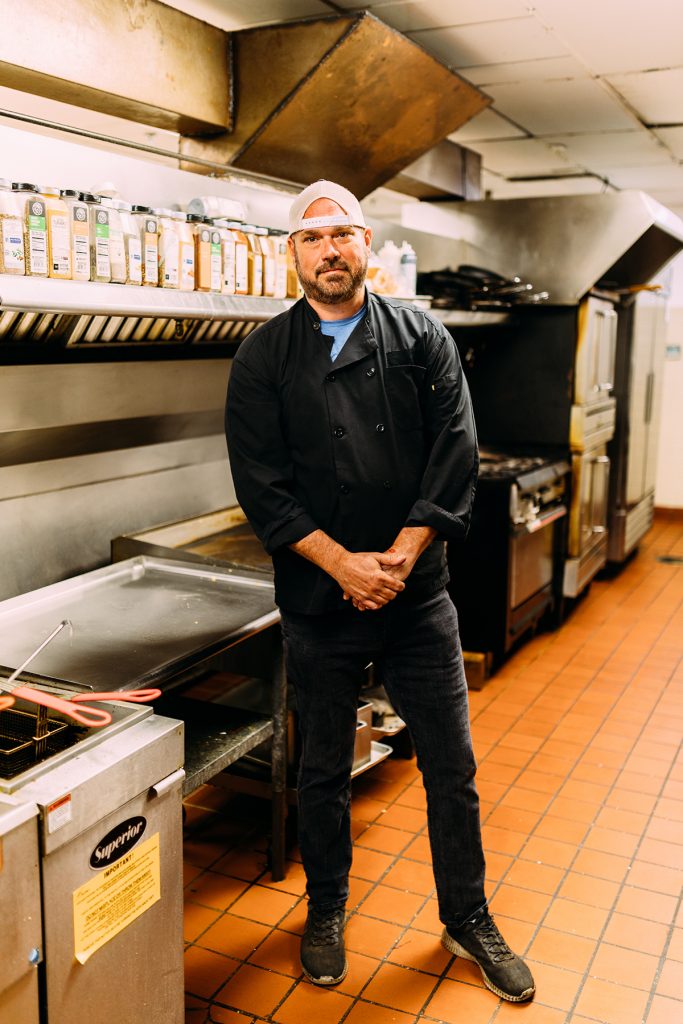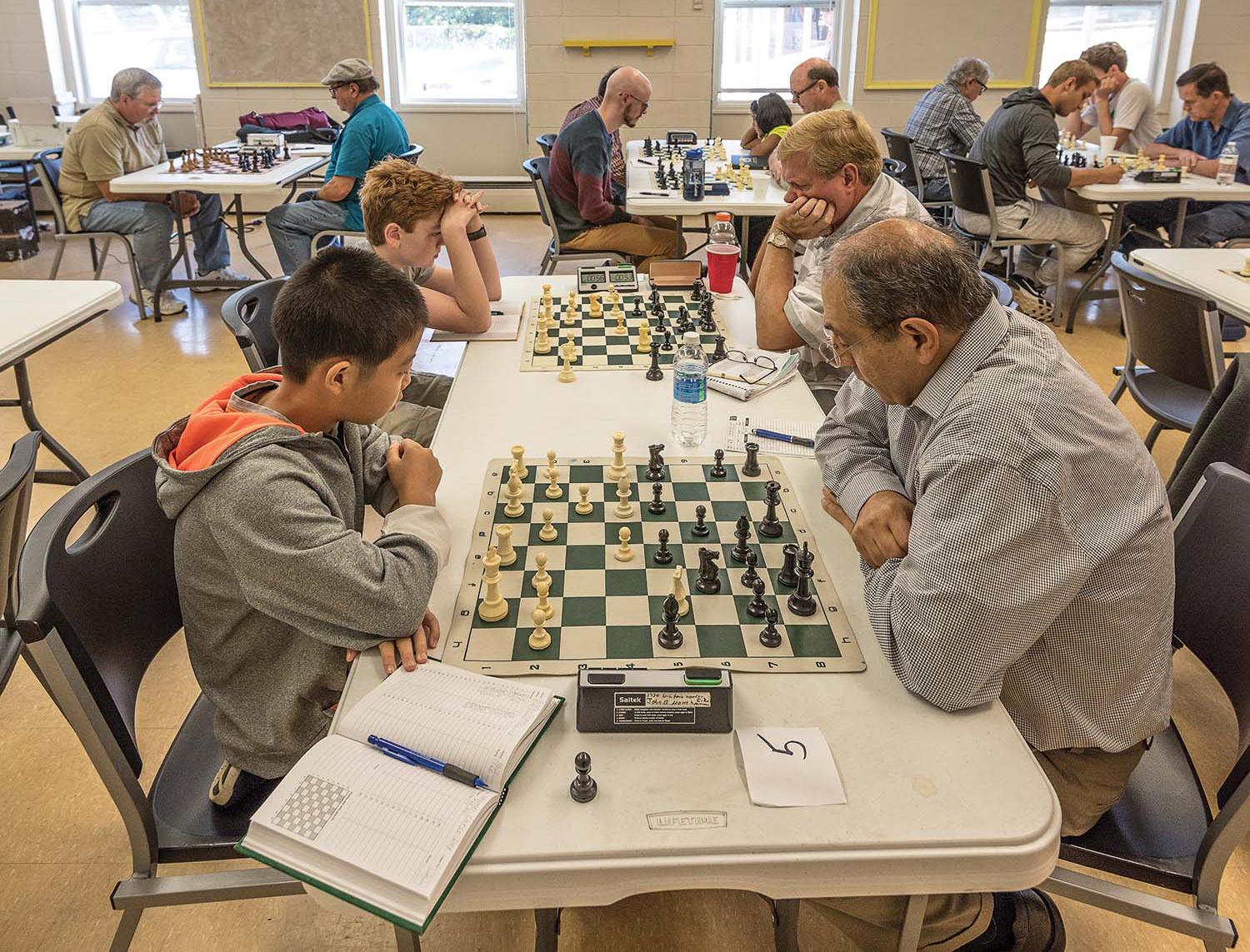
A revived Hendersonville Chess Club meets every Tuesday evening. Photos by Paul Stebner
When Wayne Spon came to Western North Carolina to play in Asheville’s Land of Sky chess tournament nearly five years ago, not long before his planned relocation to Hendersonville from Maryland, he was dismayed to find that his favorite pastime was in dire local straits. The venerable Hendersonville Chess Club had fallen into decline and was no longer meeting, partly from the lack of a stable roster of regular players. A player since childhood, Spon decided something had to be done. With the help of local chess master and instructor Neal Harris, a past president of the Hendersonville club, and Kevin Hyde, the main director of the Land of Sky tournament, a regular schedule of play and lectures on the game soon formed, and Spon became the revived club’s president.

Local chess players battle one another — and the rise of internet tourneys. Photos by Paul Stebner
Membership, at 20 players, remains relatively small, but shows definite signs of growth. “I have an e-mail list of more than 75 players,” says Spon, “which includes Saturday players from outside Henderson County.” Spon also hopes for new contacts through his position as secretary and treasurer for the North Carolina Chess Association — but a more immediate opportunity is the second annual North Carolina Seniors Tournament in early December, to be played over three days at the renovated Cascades Mountain Resort on Sugarloaf Road. Up to 50 players aged fifty or older are expected, and last year’s tournament attracted participants from as far away as Pennsylvania and Virginia. (Out-of-state players are eligible for cash prizes, but only North Carolina players can be awarded a state plaque and a supply of wine from Hendersonville’s BurntShirt Vineyards.)

“They’re the future of the royal game,” says club president Wayne Spon, referring to chess’s youngest players. Photo by Paul Stebner
Spon and his fellow players realize that older competitors are dwindling in number while younger ones seem to be proliferating. And while that’s good for the overall longevity of the ancient game, the culture has been utterly transformed. “The chess community has changed drastically in the past 20 years, due in part to the Internet, online chess sites, and an exponential growth in scholastic chess,” Spon notes. “Parents today are very education-minded and realize that chess will help their children achieve in academic endeavors. Some of these young chess wizards have coaches.”
Spon, who ranks as an upper-level Class C player, teaches the game to youngsters as well as playing online, but he and his longer-playing peers have watched kids competing with adults in tournament play — a relatively new phenomenon. Indeed, the club’s youngest player is just seven years old. And last year, 11-year-old Praggnanandhaa Rameshbabu of India made international headlines by attempting to claim the youngest Grandmaster title (he failed), challenging the reigning youngest Grandmaster, Sergey Karjakin from Ukraine, who won the title in 2002 when he was 12.
“Some of the older players don’t like to play kids, especially if they get beat by a kid who can barely see the board,” Spon says. “Personally I don’t care, because they’re the future of the royal game.” Still, the United States Chess Federation has noted the trend, too — part of why it’s common now to host tournaments specific to seniors and other “old school” players.
Like many of his chess compatriots, 65-year-old Spon has been playing since childhood and taught himself the game, attracted by its creativity and strategy. “There’s no luck involved,” he explains. “It’s basically a war game, and the chess player is the general commanding his or her troops. And it’s a team game, in that the pieces must coordinate with each other both in offense and defense. It’s a game of deductive reasoning.” Enthusiasts claim health benefits, too, based on a study conducted by the National Institute of Mental Health suggesting that chess, along with other pursuits involving mental or physical logistics (bridge, ballroom dancing), might mitigate the effects of Alzheimer’s disease. “Besides that fact, you will meet a new set of friends,” Spon adds. The social benefit is particularly germane to seniors who may live alone or far from family. Among the Hendersonville club’s membership is a 77-year-old player and an 81-year-old Master from Greenville, SC, who often visits for a game.
Players in next month’s tournament will be divided into two sections according to their ratings, with a total of five games to be played over the tournament’s three days. The USCF has announced a national tournament next year for which state champions will be eligible — one reason Spon hopes for a good turnout. “It’s a game of wit, and any player can beat another regardless of their ranking,” he says. “It’s a pure game that one can play for the rest of one’s life.”
The North Carolina Seniors Tournament will be played Friday, December 1 through Sunday, December 3 at Cascades Mountain Resort (201 Sugarloaf Road in Hendersonville). The Hendersonville Chess Club meets every Tuesday evening from 6-8:30pm at the First Presbyterian Church (699 N. Grove St.). For more information, e-mail whspon@gmail.com or see chess.com/club/hendersonville-chess-club.


